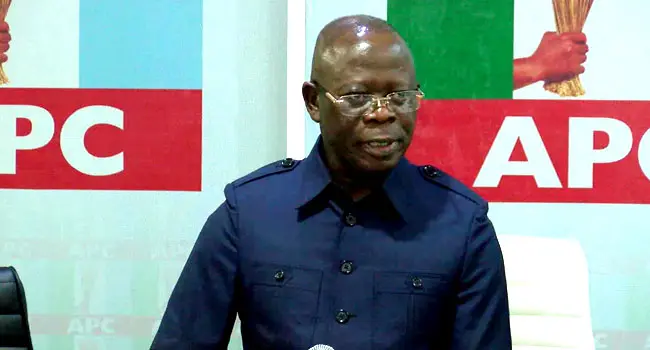Amid the wave of high-profile defections to the All Progressives Congress (APC), including the surprise defection of Delta State Governor Sheriff Oborevwori, Senator Adams Oshiomhole has redirected the debate to former Vice President Atiku Abubakar, stating that he is best suited to author a book on political defection in Nigeria.
Oshiomhole, a former Edo State Governor and ex-national chairman of the APC, made the remarks during an interview on Channels Television while responding to concerns over the recent influx of politicians into the ruling party.
In a pointed critique, Oshiomhole recalled Atiku’s political trajectory, emphasizing that the former vice president was the most notable figure in Nigeria’s defection history.
READ ALSO:
“Let me remind you that those who started defection, the most popular one in the history of Nigeria, is His Excellency, Atiku Abubakar,” Oshiomhole said.
“As a sitting Vice President, he decamped from the PDP to ACN, which is now part of the APC. Was he coerced by ACN, led then by Bola Tinubu, a non-state actor at that time?”
Oshiomhole dismissed the narrative that politicians must defect to the APC to remain relevant or win elections. Drawing from his own political history, he noted, “I ran my election as opposition—two times.
In 2007, the PDP rigged me out. I went to court. I fought them and I won. And in 2012, I went for a rerun, and I won. So I understand the meaning of opposition.”
He further argued that in situations where internal party conflicts hinder governance, the constitution allows political realignment. “Even the Nigerian constitution recognizes, if your party is in tatters… rather than spend state time on party issues, you [may] move,” he added.
According to the senator, Atiku’s multiple party switches over the years—from the PDP to ACN, back to PDP, and later to the APC to contest against Muhammadu Buhari—underscore a deeper insight into the motivations behind political defections.
“I think the best person who can write a book on why people decamp should be the former Vice President,” Oshiomhole stated. “It would be nice to ask him: as a sitting Vice President, why did you leave your party?”
Oshiomhole’s remarks come amid growing scrutiny of Nigeria’s political landscape, where ideological loyalty is often overshadowed by strategic realignments and shifting alliances ahead of elections.















